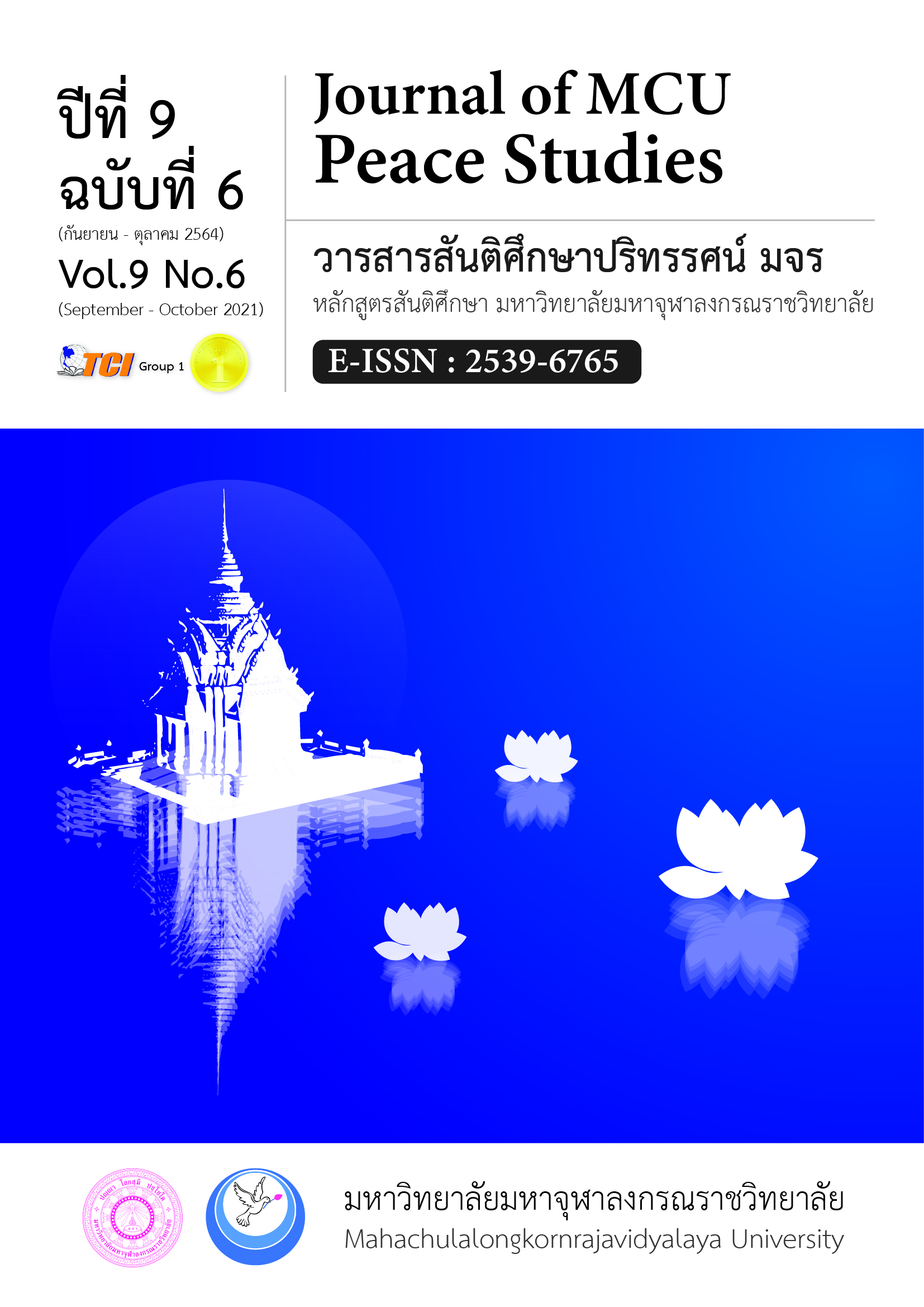บทบาทของประธานาธิบดีโจโค วิโดโด ในการใช้ทวิตเตอร์เป็นเครื่องมือการสื่อสารทางการเมือง ประเทศอินโดนีเซีย
Main Article Content
บทคัดย่อ
บทความวิจัยนี้มีวัตถุประสงค์เพื่อ 1) ศึกษาบทบาทของประธานาธิบดีโจโค วิโดโด ในการใช้ทวิตเตอร์เป็นเครื่องมือการสื่อสารทางการเมือง ประเทศอินโดนีเซีย และ 2) วิเคราะห์ผลการใช้ทวิตเตอร์ของประธานาธิบดีโจโค วิโดโด ในการเป็นเครื่องมือการสื่อสารทางการเมือง ประเทศอินโดนีเซีย โดยใช้ระเบียบวิธีวิจัยเชิงคุณภาพ ด้วยการศึกษาเอกสารและวิเคราะห์ตัวบทจากทวิตเตอร์ของประธานาธิบดีโจโค วิโดโด จำนวน 141 ทวีต ทำการวิเคราะห์ข้อมูลแบบพรรณนาวิเคราะห์ โดยอาศัยกรอบแนวคิดทฤษฎีสัญญะวิทยาและการสื่อสารทางการเมือง ในการศึกษาบทบาทของประธานาธิบดีโจโค วิโดโด ในการใช้ทวิตเตอร์เป็นเครื่องมือการสื่อสารทางการเมือง ประเทศอินโดนีเซีย ผลการวิจัยพบว่า 1) บทบาทของประธานาธิบดีโจโค วิโดโด ในการใช้ทวิตเตอร์เป็นเครื่องมือ การสื่อสารทางการเมือง ประเทศอินโดนีเซีย มีทั้งหมด 4 บทบาท ได้แก่ 1.1) บทบาทการมีส่วนร่วมกับประชาชน 1.2) บทบาทการเป็นผู้นำ 1.3) บทบาทผู้พัฒนาโครงสร้างพื้นฐาน 1.4) บทบาทชีวิตส่วนตัว 2) ผลการวิเคราะห์การใช้ทวิตเตอร์ของประธานาธิบดีโจโค วิโดโด ในการใช้เป็นเครื่องมือการสื่อสาร ทางการเมือง ประเทศอินโดนีเซีย มี 2 ด้าน ได้แก่ 2.1) ด้านการสร้างภาพลักษณ์ พบว่าประธานาธิบดี โจโค วิโดโด ใช้ทวิตเตอร์เป็นเครื่องมือในการสร้างภาพลักษณ์ที่ดีทางการเมือง 2.2) ด้านการสื่อสารเพื่อการโน้มน้าวใจ พบว่าประธานาธิบดีโจโค วิโดโด ใช้ทวิตเตอร์เป็นเครื่องมือการสื่อสารทางการเมือง สำหรับ เป็นช่องทางในการแจ้งข่าวสาร กิจกรรม และผลงานต่างๆของทางรัฐบาล โดยเป็นไปในลักษณะของการ โน้มน้าวใจ เพื่อทำให้ประชาชนเกิดทัศนคติที่ดีต่อประธานาธิบดีโจโค วิโดโด
Article Details
ทัศนะและความคิดเห็นที่ปรากฏในบทความในวารสาร ถือเป็นความรับผิดชอบของผู้เขียนบทความนั้น และไม่ถือเป็นทัศนะและความรับผิดชอบของกองบรรณาธิการ ยินยอมว่าบทความเป็นลิขสิทธิ์ของวารสาร
เอกสารอ้างอิง
Bourchier, D., & Hadiz, V. R. (2003). Indonesian Politics and Society: A reader. London and New York: Routledge Curzon.
Bunmee, T. (2015). Saussure’s revolution in semiotics, The path to postmodernism. (2thed.). Bangkok: Vibhasa Press.
Can, L., & Kaya, N. (2016). Social networking sites addiction and the effect of attitude towards social network advertising. Procedia-Social and Behavioral Sciences, 235, 484-492.
Chanthawanit, S. (2009). Sociological Theory. (2thed.). Bangkok: V-Print. (1991).
Charoensinolarn, C. (2010). Nation-State and the New World (Dis) Order. (2thed.). Bangkok: Vibhasa Press.
Charoensinolarn, C. (2012). Semiology Structuralism Poststructuralism and the Study of Political Science. (2thed.). Bangkok: Vibhasa Press.
Cheipratub, S. (1997). Communication with Politics: Emphasis on social democracy. Bangkok: Chulalongkorn University Press.
Cheipratub, S. (2008). Communication, Politics and Democracy in a developed society. Bangkok: V-Print. (1991).
Eklöf, S. (2003). Power and Political Culture in Suharto’s Indonesia: The Indonesian Democratic Party (PDI) and Decline of the New Order (1986–98). Denmark: NIAS Press.
Freedman, A. L. (2006). Political Change and Consolidation Democracy’s Rocky Road in Thailand, Indonesia, South Korea, and Malaysia. New York: Palgrave Macmillan.
Fukuoka, Y., & Thalang, C. (2014). The legislative and presidential elections in Indonesia in 2014. Electoral Studies, 36, 210-239.
Kaewthep, K. (1999). Media analysis: Concept and Technique. (2thed.). Bangkok: Edison Press Products.
Kongkirati, P. (2015). Thai Culture Politics: About Memories/Discourse/Power. Nonthaburi: Same Sky Press.
Lansley, G., & Longley, P. A. (2016). The geography of Twitter topics in London. Computers, Environment and Urban Systems, 58, 85-96.
McNair, B. (2018). An Introduction to Political Communication. (6thed.). London and New York: Routledge.
Pentina, I., & Tarafdar, M. (2014). From ‘‘information’’ to ‘‘knowing’’: Exploring the role of social media in contemporary news consumption. Computers in Human Behavior, 35, 211-223.
Phadungchivid, J. J. (2008). Culture, Communication and Identity. (2thed.). Bangkok: Active Print.
Rappler.com. (2014). Poll fraud allegations circulate online: MataMassa has so far received 403 allegations of electoral fraud, including vote count manipulation, with 325 of them verified. Retrieved May 2, 2020, from https://r3.rappler.com/world/regions/asiapacific/indonesia/63257-indonesia-election-fraud-allegations.
Ricci, A. (1998). Towards a systematic study of Internet-based political and social communication in Europe. Telematics and Informatics, 15(3), 135-161.
Robinson, R., & Hadiz, V. R. (2004). Reorganising Power in Indonesia: The politics of oligarchy in an age of markets. London and New York: Routledge Curzon.
Sholeh, M. (2014). Hasil resmi Pilpres 2014: Jokowi-JK 53.15%, Prabowo-Hatta 46.85%. Retrieved May 1, 2020, from https://www.merdeka.com/peristiwa/hasil-resmi-pilpres2014-jokowi-jk-5315-prabowo-hatta-4685.html.
Siriyuwasak, U. (2013). People’s media and communication rights in Indonesia and the Phillipines. Retrieved May 3, 2020, from https://deepsouthwatch.org/th/node/4798.
We are Social. (2018). Digital in 2018: World’s Internet Users Pass the 4 Billion Mark. Retrieved May 5, 2019, from https://wearesocial.com/blog/2018/01/global-digital-report-2018.
Yaithong, T. (2005). Political communication strategy of the Democrat Party. (Master’s thesis). Sukhothai Thammathirat University. Nonthaburi.


